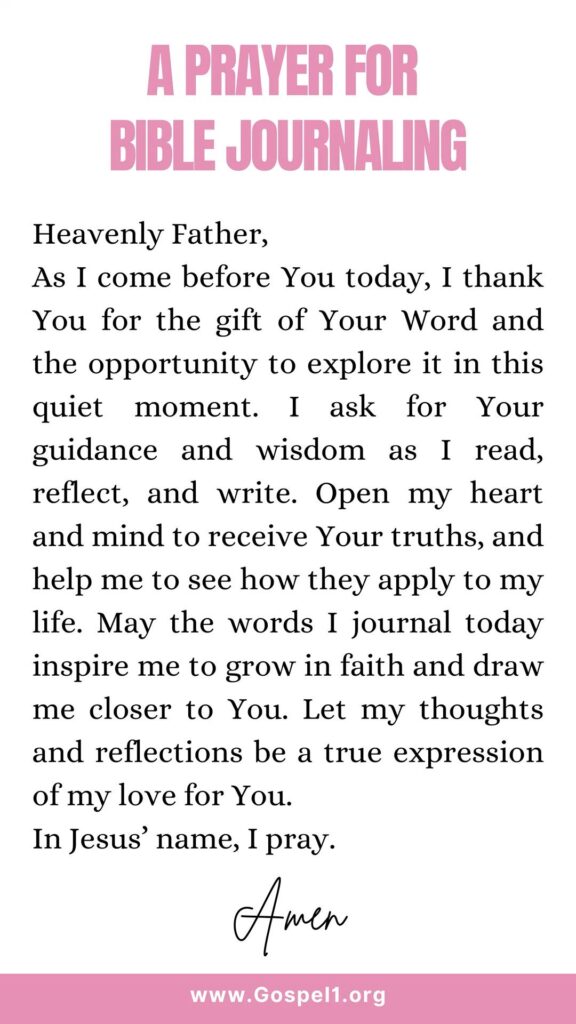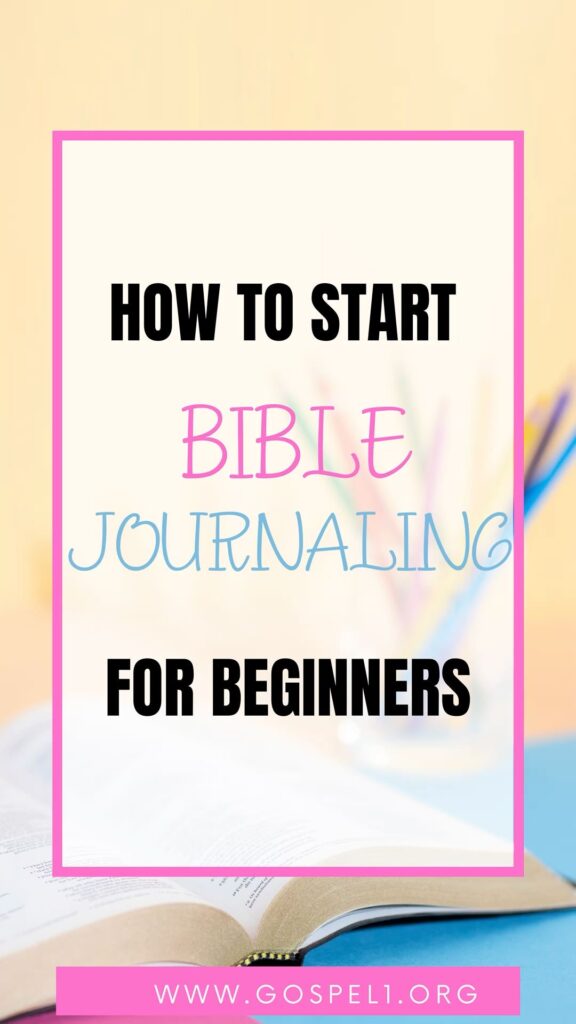Bible journaling is a lovely method to engage with Scripture effectively while growing your spiritual understanding.
Whether you’re a seasoned artist or someone who just enjoys writing, Bible journaling can be an enlightening experience. Here’s a beginner-friendly guide to help you get started on your Bible journaling adventure.
A Prayer For Bible Journaling
Heavenly Father,
As I come before You today, I thank You for the gift of Your Word and the opportunity to study it in this calm moment. I ask for Your direction and wisdom as I read, reflect, and write. Open my heart and mind to receive Your truths, and assist me to recognize how they apply to my life. May the words I journal today inspire me to develop in faith and draw me closer to You. Let my thoughts and views be a sincere manifestation of my love for You.
In Jesus’ name, I pray. Amen

What is Bible Journaling?
Bible journaling is the process of creatively documenting your thoughts, musings, prayers, and insights directly in your Bible or in a separate diary. It blends elements of art, writing, and spiritual meditation, allowing you to express your relationship with God creatively and personally.
Benefits of Bible Journaling
- Deeper Engagement:Writing and creating alongside your Scripture reading helps you interact more fully with the Bible.
- Creative Expression: Bible journaling allows you to explore your artistic side, whether through sketching, painting, or writing.
- Memory Retention: The process of writing down poems and reflections helps enhance memory and knowledge.
- Personal Reflection: It gives a platform for you to reflect on your spiritual journey and track your improvement over time.

Getting Started: Essential Supplies
To begin your Bible journaling adventure, you’ll need a few basic supplies:
1. Bible:
- Journaling Bible: Consider using a Bible specifically designed for journaling, which often includes wide margins for notes and artwork.
- Regular Bible: You can also use any Bible you have. Just be mindful that the pages may be thinner.
2. Notebook or Journal:
- If you prefer to keep your journaling separate from your Bible, choose a notebook that resonates with you. This could be lined, blank, or dotted for more flexibility.
3. Writing Instruments:
- Pens: Use pens that won’t bleed through the pages. Gel pens, colored pencils, or fine-tip markers work well.
- Pencils: Ideal for sketching and making temporary notes.
4. Art Supplies:
- Markers, or Crayons: These can add vibrant color to your pages.
- Stickers and Washi Tape: These can enhance your pages and make them visually appealing.
5. Ruler and Stencils:
- Helpful for creating clean lines and decorative borders.
Tips for Starting Your Bible Journaling Journey
1. Choose Your Focus
Decide what you want to focus on in your journaling. You might want to record:
- Verses that resonate with you: Pick passages that speak to your heart.
- Daily reflections: Write about your thoughts and prayers after your reading.
- Sermon notes: Document insights from sermons or teachings.
2. Start Small
As a beginner, don’t feel pressured to create elaborate art. Start with simple entries:
- Write a verse and underline or highlight it.
- Add a few sentences about what the verse means to you.
- Experiment with small drawings or doodles related to the verse.
3. Create a Routine
Establish a scheduled time for your Bible journaling. This could be in the morning, around lunch, or before bed. Consistency helps enhance your engagement and makes journaling a cherished habit.
4. Pray Before You Start
Begin each journaling session with a short prayer, asking God to guide your thoughts and reflections. This spiritual preparation can provide a significant tone for your journaling.
5. Don’t Worry About Perfection
Your journaling doesn’t have to be perfect. Embrace errors and let your creativity flow. The purpose is personal expression, not artistic quality. Remember that this is a personal journey between you and God.
6. Incorporate Different Elements
Try various journaling styles to keep things fresh:
- Artistic Journaling: Focus on drawing or painting images that represent your reflections.
- Lettering and Calligraphy: Practice beautiful lettering for verses and quotes.
- Collage: Use magazine cutouts, photographs, or other memorabilia to create a visual story of your spiritual journey.
7. Use Prompts for Inspiration
If you’re unsure where to start, consider using prompts. Here are a few examples:
- What does this verse teach me about God’s character?
- How can I apply this passage to my life?
- What are my prayers or hopes related to this Scripture?
8. Share Your Journey
If you feel comfortable, consider sharing your Bible journaling with a friend or a small group. Sharing views can bring encouragement and inspiration, and you could uncover new perspectives on Scripture.
Resources for Bible Journaling
- Books: Look for books specifically about Bible journaling. They often contain tips, techniques, and inspiration.
- Online Communities: Join Bible journaling groups on social media platforms like Facebook or Instagram to connect with other journalers, share ideas, and get inspiration.
- YouTube Tutorials: Watch video tutorials to learn different techniques and get inspired by other journalers’ styles.
Conclusion
Bible journaling is a joyful method to strengthen your faith, express creativity, and foster a stronger relationship with God. By starting with simple practices and progressively introducing more aspects, you’ll create a style that resonates with you. Remember, there’s no right or wrong way to journal; what counts is that it reflects your personal experience of faith. Enjoy the process, and let your heart guide your pen!